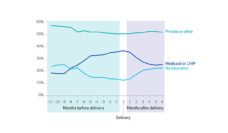Having a baby can be stressful, and can have adverse effects on women’s psychological and physical health. Expressive writing may be a useful intervention for improving wellbeing in postnatal women at risk of poor mental and physical health. It may also reduce costs to healthcare services. Such interventions involve a person writing about their deepest thoughts and feelings about a specified stressful event or situation for at least 15 minutes a day on three consecutive days.
Evidence regarding expressive writing as a health intervention is mixed, but some researchers argue that it may be useful in certain contexts, including the postpartum period. Previous research with postpartum women indicates that writing about experiences may have a positive impact on women’s adjustment to having a baby and their overall health. These studies focused on specific populations, such as mothers of premature babies, and had comparatively small sample sizes, so the extent to which conclusions can be drawn about the effectiveness of expressive writing for a wider range of postpartum health issues is limited.
To fill this research gap my colleagues and I conducted the Health After Birth Trial (HABiT) randomized controlled trial to evaluate the effectiveness of expressive writing in improving postpartum mental and physical health, quality of life, healthcare service costs, and change in health status. Participants were 894 women in the United Kingdom who were randomly allocated to one of three groups 6 to 12 weeks after birth: expressive writing (where they were asked to write about a very stressful or distressing event that they had experienced since becoming pregnant), a control group asked to write about a neutral topic (describing a room), and normal care.
The results of the trial were mixed, and quite complex. Overall, there was no evidence to suggest expressive writing would be useful as a universal intervention to promote the health of every woman after giving birth. However, our data tentatively suggest that expressive writing may be more effective than normal care or a neutral writing task in improving postpartum health in women with mild to moderate depression.
Considered alongside other research findings, evidence is therefore building for expressive writing to be used as a targeted intervention for women whose wellbeing is at risk following birth.
Women who did expressive writing reported that their level of stress in relation to the event they wrote about decreased after completing the intervention. Women engaging in expressive writing also sought healthcare less frequently than the other women in the study, therefore costing healthcare providers less. When we linked women’s improvement in quality of life to the cost of healthcare use, the cost per unit of improvement in quality of life was also lower for these women. In interpreting these findings, it is important to bear in mind that the UK has a nationalised health service, so women are not dependent on financial means or private insurance to access comprehensive healthcare.
The most significant challenges to the HABiT study were a high drop-out rate, and relatively low number of women managing to complete the expressive writing task according to the instructions. The early weeks of a baby’s life are extremely demanding, and it is likely that this impacted the drop-out rate and the ability of participating mothers to complete the writing tasks as per the instructions. This indicates the importance of timing the intervention so that it is feasible for mothers to complete it.
Other studies exploring expressive writing in postpartum women have found that it does have positive effects on their wellbeing. However, women participating in some of these studies were at high risk for poor mental and physical health outcomes because they had a premature or sick baby requiring neonatal intensive care. Our study set out to establish whether expressive writing may be universally effective in improving women’s postpartum health. There was no evidence of its effectiveness for every woman giving birth, but the findings do tentatively indicate that women with mild to moderate depression may benefit.
Considered alongside other research findings, evidence is therefore building for expressive writing to be used as a targeted intervention for women whose wellbeing is at risk following birth. However, due to the small numbers of women on which these findings are based, more research is needed to examine this further.
Photo by Plush Design Studio on Unsplash














